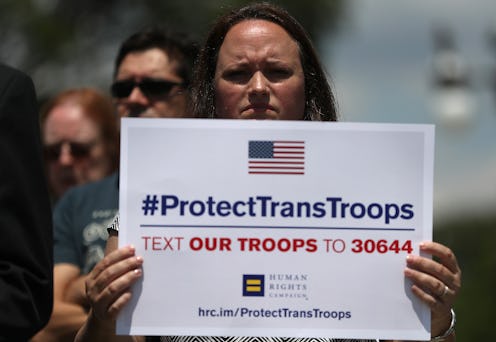News
A Second Judge Has Blocked Trump's Transgender Military Ban

Bolstering the case against his July announcement, a second judge blocked President Trump's ban on transgender military personnel in a decision issued Tuesday. The recent ruling referenced a quote from a separate due process case that aptly encapsulated the court's reaction to Trump's transgender ban: "It might be fairly said to shock the contemporary conscience."
Brought by the American Civil Liberties Union (ACLU) of Maryland, the case was heard by District Judge Marvin J. Garbis, a President George H.W. Bush appointee. In his ruling, Garbis rejected the tradition of "judicial deference" to the executive branch concerning military matters, arguing it was not applicable in this case of "capricious" and "arbitrary" impromptu policy making by the president.
Garbis agreed with the plaintiffs' assertion that Trump's ban on transgender military personnel was "plainly inconsistent with all available data" and "serves no legitimate interest and cannot be reconciled with the liberty and equality protected by the Constitution."
He also argued a string of tweets from Trump in July indicated the president's desire to reverse the Pentagon's 2016 decision allowing transgender individuals to serve openly came not from a serious policy review, but rather Trump's own personal preference.
In his written ruling, Garbis includes screenshots of Trump's tweets declaring that transgender individuals would no longer be allowed to serve in the military. On July 26, 2017, Trump wrote over the series of three tweets that after consulting with "my Generals and military experts," the United States would neither accept nor allow "[t]ransgender individuals to serve in any capacity in the U.S. military." Trump went on to write that the military "must be focused" on "victory and cannot be burdened with the tremendous medical costs and disruption that transgender in the military would entail."
Taking serious issue with Trump's approach to altering a policy that has enormous real-life consequences for transgender military servicepeople, Garbis wrote, "A capricious, arbitrary, and unqualified tweet of new policy does not trump the methodical and systematic review by military stakeholders qualified to understand the ramifications of policy changes."
And as Mark Joseph Stern points out at Slate, both Garbis and another judge who ruled against the Trump administration in October, Judge Colleen Kollar-Kotelly, included evidence in their rulings showing that transgender servicepeople do not pose financial or other risks to the military. "Both judges took pains to document the many studies—by RAND, by the Department of Defense, and by each branch of the armed forces—finding that transgender service has no detrimental ramifications," writes Stern.
Garbis' ruling went beyond Kollar-Kotelly's. While both put a halt on the plan to discharge transgender personnel, Garbis also ruled that gender reassignment surgery must continue to be covered by the military.
A RAND Corporation study found there are between 2,000 and 11,000 transgender individuals currently serving in the U.S. military. An analysis of the unique health care costs posed by transgender servicepeople found medical expenses would fall somewhere between $2.4 and $11.4 million a year. That amounts to a roughly 0.1 percent increase of the military's total annual budget.
Lauren Ehrsam, a spokeswoman for the Justice Department, stated they disagreed with the ruling and are "evaluating the next steps."
But the ACLU viewed the ruling as a victory. Joshua Block, the lawyer representing the six military plaintiffs in the case, said, "We’re pleased that the courts have stepped in to ensure that trans service members are treated with the dignity and respect they deserve.”
For those fearful that Trump and his administration's Justice Department would be able to unilaterally reverse military protections for transgender servicepeople, Garbis' ruling is welcome proof that the court system can hold its own against policies it deems unconstitutional.